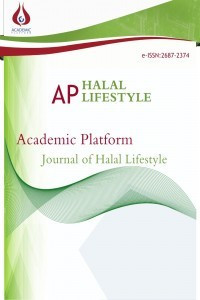Gen Z as Halal Consumers: Omani Scope
Gen Z as Halal Consumers: Omani Scope
This study aimed to describe knowledge, attitudes, perception and behavior of getting started (16-25) age group towards Halal concept in Oman. The study has been designed as descriptive survey to collect quantitative data from primary sources via e-questionnaire. Convenience sampling method was selected due to COVID-19 conditions during data collection. The study demonstrated that the self-identity of young Omani consumers and their religious views does not influence their impression of halal items considerably. Even young Omani consumers do not considerably influence their intention to buy halal products in respect of halal certified products. Yet young Omani customers have considerable influence on their awareness of halal products, their religious commitment and belief. However, young Omani consumers' individual innovation with their understanding of Halal certified products has not shown any substantial impact on Omani's young consumers' attitude towards Halal items.
Keywords:
Halal, Awareness, Lifestyle, consumption, youngsters Oman,
___
- AFENDI, N. A., AZIZAN, F. L. & DARAMI, A. I. 2014. Determinants of halal purchase intention: case in Perlis. International Journal of Business and Social Research, 4, 118-123.
- AHMAD, A. N., ABD RAHMAN, A. & AB RAHMAN, S. 2015. Assessing knowledge and religiosity on consumer behavior towards halal food and cosmetic products. International Journal of Social Science and Humanity, 5, 10.
- AZIZ, Y. A. & CHOK, N. V. 2013. The role of Halal awareness, Halal certification, and marketing components in determining Halal purchase intention among non-Muslims in Malaysia: A structural equation modeling approach. Journal of International Food & Agribusiness Marketing, 25, 1-23.
- BORZOOEI, M. & ASGARI, M. 2013. Halal branding and purchase intention: A brand personality appeal perspective. International Journal of Business and Management Invention, 2, 23-27.
- BORZOOEI, M. & ASGARI, M. 2014. The effect of religious commitment on halal brand relationship and purchase intention. The International Journal’s Research Journal of Economics and Business Studies, 3, 14-19.
- DALI, N., SULAIMAN, S., SAMAD, A. A., ISMAIL, N. & ALWI, S. H. Halal Products From The Consumers Perception. An Online Survey. Proceeding of the Islamic Entrepreurship Conference, KolejUniversiti Islam Malaysia, 2007.
- HANZAEE, K. H. & RAMEZANI, M. R. 2011. Intention to halal products in the world markets. Interdisciplinary Journal of research in Business, 1, 1-7.
- HASAN, M. 2019. Social marketing: an Islamic perspective. Journal of Islamic Marketing.
- HASSAN, H. & RAHMAN, M. S. Transformation of hypermarket retailing industry in Malaysia. 2012 International Conference on Innovation Management and Technology Research, 2012. IEEE, 513-516.
- HUSAIN, R., GHANI, I., MOHAMMAD, A. & MEHAD, S. 2012. Current practices among Halal cosmetics manufacturers in Malaysia. Journal of Statistical Modeling and Analytic, 3, 46-51.
- IZBERK-BILGIN, E. & NAKATA, C. C. 2016. A new look at faith-based marketing: The global halal market. Business horizons, 59, 285-292.
- JAAFAR, S. N., LALP, P. E. & NABA, M. M. 2012. Consumers’ perceptions, attitudes and purchase intention towards private label food products in Malaysia. Asian Journal of Business and Management Sciences, 2, 73-90.
- JANNAT, M. & ISLAM, M. M. 2019. Consumers' purchase intention towards certified Halal foods. International Journal of Islamic Marketing and Branding, 4, 228-248.
- KAMARUZAMAN, K. A. 2008. Halal cosmetics: Between real concerns and plain ignorance. The Halal Journal, 3, 26-28.
- LADA, S., TANAKINJAL, G. H. & AMIN, H. 2009. Predicting intention to choose halal products using theory of reasoned action. International journal of Islamic and Middle Eastern finance and management.
- MAJID, M. B., SABIR, I. & ASHRAF, T. 2015. Consumer purchase intention towards Halal cosmetics & personal care products in Pakistan. Global Journal of Research in Business & Management, 1.
- MATHEW, V. N. 2014. Acceptance on halal food among non-Muslim consumers. Procedia-Social and Behavioral Sciences, 121, 262-271.
- MUKHTAR, A. & BUTT, M. M. 2012. Intention to choose Halal products: the role of religiosity. Journal of Islamic Marketing.
- PATTON, D. 2009. Could halal cosmetics be developing into a new global C and T niche market? Retrieved from Halalfocus. net/could-Halal-cosmetics-be-developing-into-a-new-global-ct-niche-market/28May.
- RAJAGOPAL, S., RAMANAN, S., VISVANATHAN, R. & SATAPATHY, S. 2011. Halal certification: implication for marketers in UAE. Journal of Islamic Marketing.
- REZVANI, S., RAHMAN, M. S., DEHKORDI, G. J. & SALEHI, M. 2013. Consumers' perceptual differences in buying cosmetic products: Malaysian perspective. Middle-East Journal of Scientific Research, 16, 1488-1496.
- SHAFIE, S. & OTHMAN, M. N. Halal Certification: an international marketing issues and challenges. Proceeding at the International IFSAM VIIIth World Congress, 2006. 28-30.
- SR, H., HASHIM, H., YUSOF, R. & ALIAS, N. 2013. Relationship between product factors, advertising, and purchase intention of halal cosmetic. VOL. 21 (S) JUN. 2013, 85.
- SWIDI, A., CHENG, W., HASSAN, M. G., AL-HOSAM, A. & MOHD KASSIM, A. W. 2010. The mainstream cosmetics industry in Malaysia and the emergence, growth, and prospects of halal cosmetics, College of Law, Government and International Studies, Universiti Utara Malaysia.
- TENG, P. K. & JAMALIAH, W. Investigating students awareness and usage intention towards halal labelled cosmetics and personal care products in Malaysia. 4th International Conference on Business and Economic Research (4th ICBER 2013), Indonesia: Bandung, 2013.
- TIEMAN, M. 2011. The application of Halal in supply chain management: in‐depth interviews. Journal of Islamic Marketing.
- WILSON, J. A. 2014. The halal phenomenon: an extension or a new paradigm? Social Business, 4, 255-271.
- WILSON, J. A. & HOLLENSEN, S. 2013. Assessing the implications on performance when aligning customer lifetime value calculations with religious faith groups and after lifetime values–a Socratic elenchus approach. International Journal of Business Performance Management, 14, 67-94.
- Yayın Aralığı: Yılda 2 Sayı
- Başlangıç: 2019
- Yayıncı: Akademik Perspektif Derneği
